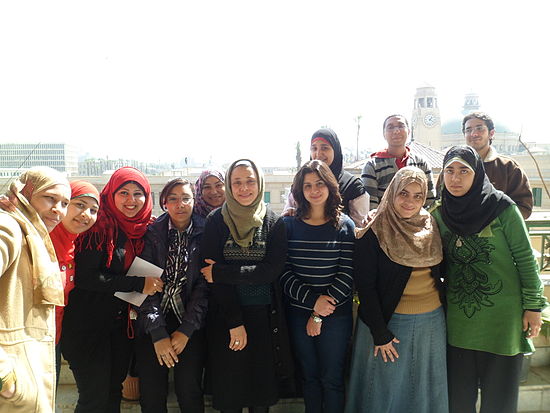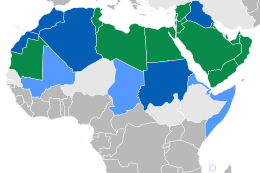Reforming the education programs: lessons from Cairo

Background
Wikipedia has a long history of collaborating with educational institutions. The Schools and Universities Program—international and in many languages, but dominated by American institutions—started in 2003 and evolved case by case with little system. This changed in 2009 as Wikimedia embarked on its formal strategic process, and outreach in higher education came to be seen in terms of achieving explicit goals—especially that of increasing editor participation.

The first "strategic" Wikimedia Foundation program to emerge was the Public Policy Initiative (PPI) in 2010–11 (see Signpost coverage: September 2010, July 2011), a highly successful pilot to improve the English Wikipedia’s articles in the field of US public policy, centering on the participation of college classes supported by Wikipedia ambassadors, and funded by the Stanton Foundation. The foundation then expanded the model beyond the US, most notably with the Indian Education Pilot 2011 in Pune. This ended in abject failure (Signpost coverage), largely due to a lack of community engagement by the consultants running the pilot, and it resulted in significant damage to the reputation of the education program within the Wikipedia community. Now the so-called US–Canada education program is in reform mode, attempting to resolve the structural problems and controversial issues that have arisen over the past year.
Other programs have since included chapter-run pilots in Europe, and the Cairo pilot as part of the foundation’s Arabic language initiative, which gathered pace under the guidance of the PPI core staff just as the problems in the Indian program were coming to light and the US education program was scaling up the PPI structures.
The Arabic language is a priority for the Wikimedia Foundation because of the significance of the language and its peoples as opposed to the relatively small size of the Arabic Wikipedia and editing community. As the sixth most popular language of the world, Arabic is the native tongue of about 300 million people. It is spread laterally thousands of kilometres from Morocco, the Spanish Sahara, and Mali on the Atlantic coast of North Africa to its millenium-old eastern boundary on the Iraq–Iran border. Arabic's cultural and scientific heritage alone make it an important part of the goals of the movement to provide free knowledge for everyone; but its importance as one of the world's great contemporary languages spoken by great numbers of people in societies undergoing radical change have highlighted the value of supporting movement-related education programs there. Egypt is the largest of the Arab-language nations, with some 80 million speakers. Egyptian Arabic is just one of many dialects; although there is a small Wikipedia site devoted to the dialect, the education program has focused on the standard-Arabic Wikipedia.
The Cairo pilot
The recent pilot deployed methods to overcome significant challenges in both real-life and on-wiki environments, and has produced positive results despite the current political instability in Egypt and more widely the wave of demonstrations and protests in the Arab-speaking world since December 2010, known in some quarters as the Arab Spring.
While the Indian pilot and some participating college classes in the US education program suffered from structural problems, such as an unbalanced student–ambassador ratio, and were widely criticised as being out-of-touch with the editing community, the Cairo pilot was carefully designed to marshal strong support for the program and individual students from the local university and Arabic Wikipedia communities. This was achieved through careful organisation at the institutions and by reaching out in advance to the Arabic Wikipedia community, especially local community members on the ground in Cairo, and limiting the number of participating classes to seven, each with a maximum size of fifteen.

The program produced solid overall results, with 246 articles edited by 56 participating students. Major contributions to the Arabic Wikipedia by article creation, improvement and translations like of the Spanish articles of the author Laura Restrepo (Google translate) and the painter Ernesto Sabato (Google translate) or the Panic of 1907 (Google translate) into Arabic were made during the pilot. Both lecturers and participating students as well as community members involved were largely satisfied with the initiative and its conduct and a large number of students taking part in this terms project signed up as campus ambassadors for the next term, thereby expanding the previously small local Cairo community.

The Signpost was unable to speak with local participants at short notice, but LiAnna Davis, the foundation's Wikipedia education program communications manager, made contact with us after an all-day meeting in Cairo to discuss how the movement can use the results to further improve its education initiatives. "We had no idea if the Wikipedia Education Program would work in Egypt, especially given the uncertainty following the Arab Spring. We wanted to start very small in case it didn't work. Our goal was to see if the program could work in Egypt, and if it was appropriate for professors and students to edit the Arabic Wikipedia with help from ambassadors. The answer was that it absolutely worked. Taking students, professors, and ambassadors together," LiAnna said, "50% were very satisfied, 38% somewhat satisfied, 4% mixed reactions, and 8% somewhat dissatisfied."
We asked LiAnna to elaborate on the statement in the draft pilot report that "the campus ambassadors' skills for effectively helping the students need to be improved". For the initial campus ambassador training," she said, "we recruited current Cairo Wikipedians to lead the training in Arabic. We suggested some topics, but it was a community-led process focusing on what they thought was most important for students to know from their ambassadors. We expect ... a learning process that will enable them to continuously improve their ability to support the teachers and students." LiAnna and her colleagues are delighted that "the students who participated in the pilot were very eager to be campus ambassadors next term and help improve the training to focus on what they as students receiving help from Ambassadors felt was most needed."
A notable aspect of the report is that some female students were uncomfortable in communicating online with people they didn’t know, and had a male student in the class write as proxies. We asked LiAnna whether this signals a larger problem in getting female Arabic-speakers to participate in WP. She pointed out that it just wasn't possible to recruit female online ambassadors because the community isn't yet big enough. The 15 online ambassadors (as opposed to the campus ambassadors) were drawn from the ranks of experienced Arabic Wikipedians, who number fewer than 70 over the entire Arabic-speaking population worldwide, and are almost entirely male. "One positive is that 87% of the students who participated were female, and they've expressed a lot of enthusiasm for continuing to contribute to Wikipedia, so we're hopeful we can have an impact on those numbers as the program grows larger."

"According to our survey, 92% indicated they'd like to continue. Of course, other responsibilities often get in the way of good intentions, but we are hopeful that many will continue to contribute in some form to the Arabic Wikipedia. Students, professors, and ambassadors all spoke extensively about how important it is to have information available in Arabic on the internet, and how it's their civic duty to improve the Arabic Wikipedia. I'm really looking forward to seeing this program mature and what kind of difference we can make on the Arabic WIkipedia."
The only technical hitch was apparently that participants found the left-to-right wikimarkup confusing and unintuitive (almost all semitic languages are written from right to left). LiAnna says that the foundation technical department has been informed of this issue.


Discuss this story